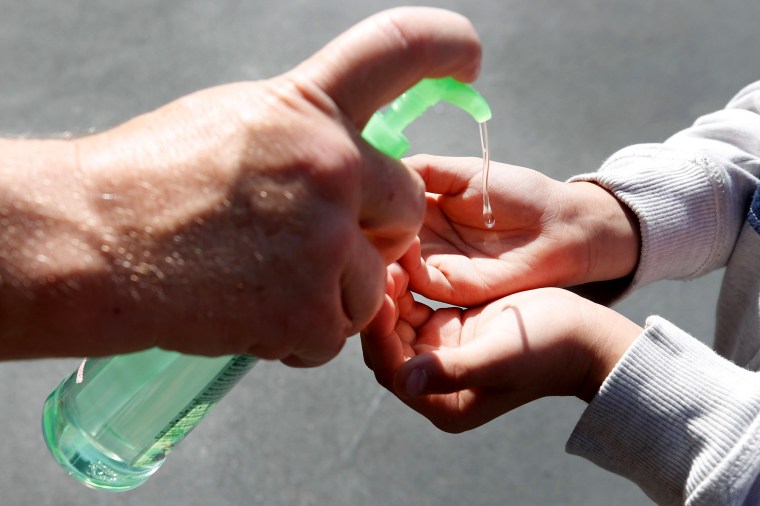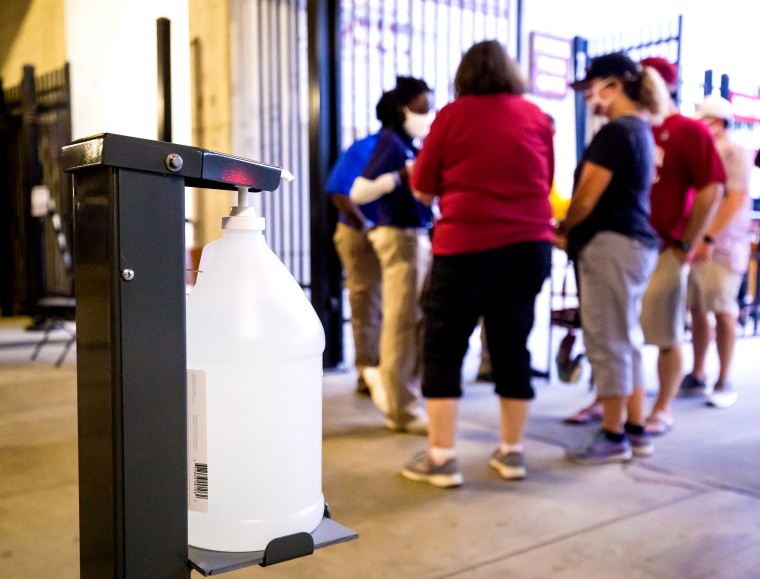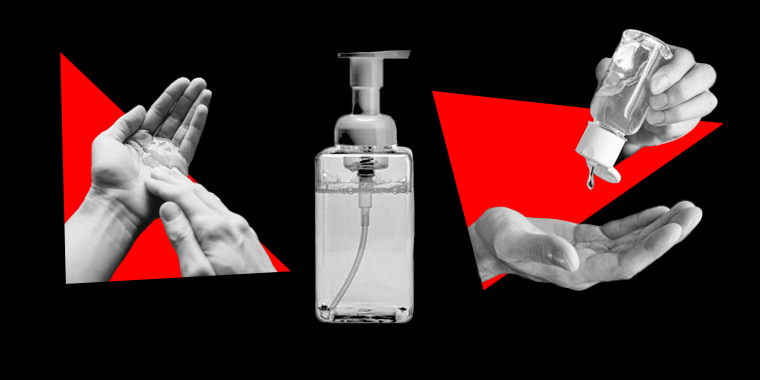This article was produced by FairWarning (www.fairwarning.org), a nonprofit news organization based in Southern California that focuses on public health, consumer, labor and environmental issues. You can sign up for their newsletter here.
A 44-year-old man in the Southwest, seeking medical treatment after his vision suddenly deteriorated in late spring, admitted that he had been drinking hand sanitizer for a few days. Blood tests revealed he had been poisoned by methanol, an extremely toxic form of alcohol that is never supposed to be used in consumer products like hand sanitizer. Despite treatment, he was left permanently blind.
The case was part of a disturbing trend that toxicologists in New Mexico and Arizona caught wind of beginning in May. Dr. Steven Seifert, medical director of the New Mexico Poison and Drug Information Center, noticed that two adults had been hospitalized after drinking hand sanitizer made with methanol. In June, the center treated three more adults who had been poisoned by methanol, making it “absolutely clear that there was something circulating in our state,” said Seifert, who notified New Mexico’s Department of Public Health.
The coronavirus pandemic has triggered a huge spike in demand for hand sanitizer, and with it, a shortage of ethanol, which is typically used as the active ingredient in hand sanitizers. That may be leading to the use of a highly toxic substitute — methanol, or wood alcohol — in products that have been rushed onto store shelves in the United States. The FDA has counted 17 deaths from exposure to methanol-tainted sanitizer this year, and spokesman Jeremy Kahn says the agency has received an additional 2,000 reports of exposure or injuries.
It’s a vivid example of the Food and Drug Administration’s lack of authority to crack down on dangerous over-the-counter drugs, a category that includes hand sanitizers. The FDA has responded by issuing numerous alerts about the dangers of ingesting methanol-containing sanitizers and asking manufacturers to issue recalls. But the agency lacks authority to force recalls, and some manufacturers have delayed taking action, according to warnings issued by the FDA and a FairWarning review of the agency’s database of hand sanitizers to avoid.
Despite the FDA’s warnings, methanol-tainted hand sanitizer ended up at retail outlets across the U.S., including at Dollar Tree, where it was sold as the store brand, according to the FDA. The retail chain stopped selling it after the manufacturer recalled it and said in an email, “We continue to be committed to our customers’ safety.”
In another case, on July 1, the FDA told a Mexican company, Soluciones Cosméticas, that samples of its Bersih brand sanitizer seized at the border by customs agents were found to be contaminated with methanol. But it took another two weeks before the company agreed to pull the product from store shelves in the U.S., according to a warning letter that the FDA sent. The agency also asked the company to recall two other brands of hand sanitizer it manufactured and sold for U.S. consumers, but if it’s done so, it hasn’t yet notified the FDA. The company did not respond to a request for comment.
Another Mexican producer, Eskbiochem, made nine different methanol-tainted sanitizers sold in the U.S., the FDA said. While some distributors have agreed to pull products made at the company’s factory, Eskbiochem has not yet agreed to issue a recall across its production chain, or at least hasn’t notified FDA that it plans to do so, according to another FDA warning letter. The FDA says it will continue having Eskbiochem’s products seized at the border if the company does not comply. A person who answered the phone at company headquarters declined to respond to questions.
“I think consumers would be shocked to learn that the FDA doesn’t have authority to pull those products,” said Dr. Michael Carome, director of the Health Research Group at the advocacy organization Public Citizen, which has argued for giving the FDA the power to force recalls of prescription and over-the-counter drugs. (Hand sanitizer is classified as an over-the-counter drug.)
FDA officials declined comment on whether the agency should have recall authority over drugs. But in a written statement, they said that patient safety is its ''top priority. The FDA continues to warn consumers and health care professionals not to use the nearly 200 entries currently on the agency's hand sanitizer list." According to the statement, "The agency has taken additional action to help prevent certain hand sanitizers from entering the United States by placing them on an import alert. "

The FDA has long had the power to order recalls of defective medical devices. It gained authority to force recalls of contaminated food under the Food Safety Modernization Act signed into law in 2011. A year later, the agency used the power for the first time to shut down a peanut butter factory linked to salmonella poisoning that sickened 41 people.
But an attempt by Rep. Rosa DeLauro, D-Conn., to give the agency similar authority over drug manufacturers was opposed by the industry and failed in 2017.
Toxicologists say methanol should never be used in hand sanitizer, because it could poison people who drink it as a substitute for other forms of alcohol.
Despite the perils of its potent alcohol content, hand sanitizer has “always been kind of popular,” said Dr. William Banner, the medical director for the Oklahoma Center for Poison and Drug Information and past president of the American Association of Poison Control Centers. “But the fact that now it's contaminated is what the difference is.”
Hand sanitizer typically contains about 60 percent ethanol, the same form of alcohol used in beer, wine and spirits, at a fraction of the cost. “It’s usually the product of desperation, like you can't get access to it, I don’t have money, I don't have transportation,” said Tony Pizon, the chief of medical toxicology at the Pittsburgh Poison Center.
The FDA has also been issuing warnings about hand sanitizers with other problem ingredients, such as 1-propanol, another extremely toxic form of alcohol.
Most producers of methanol-containing sanitizers have agreed to recall their products after the FDA flagged them, according to a review of the FDA’s database, but more brands continue to be added to the FDA’s warning list, which included nearly 200 products as of Sept. 17. The agency does not have a breakdown of how many problem hand sanitizers are still for sale in the U.S. compared to how many have been voluntarily recalled.

Data from poison control centers suggests that Americans are still accessing methanol-contaminated sanitizers, though the numbers have fallen following the FDA’s warnings. During the first half of September, the American Association of Poison Control Centers said it received 27 case reports about methanol-containing products, after getting 1,280 reports in July and 384 in August.
In most cases, people reported using the product on their skin or inhaling vapors and did not suffer observable injuries, but called poison control centers after finding out the substance was toxic. Though it’s never a good idea to rub a toxic substance on your skin, toxicologists say that the risk of getting methanol poisoning from using hand sanitizer as intended is minimal. Children and toddlers have been treated at poison control centers after ingesting sanitizer, but most of the people ingesting hand sanitizer have been adults, toxicologists say.
“The poison centers get calls about hand sanitizer ingestions every year, but this year there is an increase,” said Dr. Anne-Michelle Ruha, a medical toxicologist at the Banner Poison and Drug Information Center in Phoenix.
Last year, from May through late August, the Phoenix center treated 81 patients who had ingested hand sanitizer. This year that figure reached 205 in the same period. And in 25 of those cases, toxicologists suspected or confirmed that the patients had ingested methanol. Some of the cases were from the Navajo reservation, Ruha said.
The reservation, which covers parts of Arizona, New Mexico and Utah, has long banned alcohol sales to curb substance abuse, though people can easily buy alcohol in neighboring towns, and some people seek out hand sanitizer instead because it’s more affordable, Shardai Pioche, a research associate at the Johns Hopkins Center for American Indian Health, previously told NBC News.
Typically adults who drink ethanol sanitizers don’t seek medical treatment unless they have misjudged their intake. Methanol, on the other hand, can cause vision and brain damage when consumed in small amounts. “Talk about drinking and pickling your brain, that takes years,” said Banner, the Oklahoma poison center medical director. “With methanol, one time will do it.”
Ethanol and methanol smell and look the same. The toxic effects of methanol don’t become apparent until it is metabolized. Early signs of methanol poisoning are rapid breathing and an upset stomach. Victims then typically experience fuzzy tunnel vision that seems like being in a snowstorm. “And then pretty soon, it's a whiteout,” Banner said.
The toxic effects can be reversed with medication if treated in time. The toxicologists in New Mexico and Arizona who noticed a spike in methanol poisonings published a report in August. Together, they had treated 15 adults in May and June. Four died and three suffered vision loss. All were adults ages 21 to 65 and “had a history of swallowing alcohol-based hand sanitizer products,” the report says.
Toxicologists advise consumers to use sanitizer only as intended. “You can't sanitize your child,” Banner said. “You can't rub it all over them, head to toe [and] think you're helping them out, because you're not.”
But deterring people from drinking sanitizer is more complicated. According to Seifert, of the New Mexico poison center, “when people do have difficulty getting access to their usual source of ethanol, they may start looking for alternative sources, and that may be a factor that drove this particular epidemic.”

